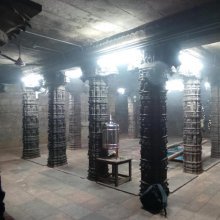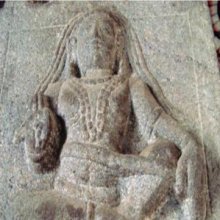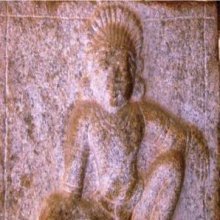Ardha, Ārdha: 16 definitions
Introduction:
Ardha means something in Hinduism, Sanskrit, Marathi, Hindi. If you want to know the exact meaning, history, etymology or English translation of this term then check out the descriptions on this page. Add your comment or reference to a book if you want to contribute to this summary article.
Images (photo gallery)
(+25 more images available)
In Hinduism
Jyotisha (astronomy and astrology)
Source: Google Books: Studies in the History of the Exact Sciences (Astronomy)Ardha (अर्ध) refers to “half” (of the Sun’s orb), according to Govinda Daivajña’s Pīyūṣadhārā (verse p.424), a commentary on Rāma Daivajña’s Muhūrtacintāmaṇi (AD 1600).—Accordingly, “[...] After having seen the rise of half of the Sun’s orb [i.e., ardha-udaya], or the setting of the half likewise, the instrument having the aforementioned characteristics should be deposited, with this sacred formula.—{‘Should be deposited’ means ‘in a basin filled with water’. Thus spoke Nārada: In a copper basin, which is filled with water, which is decorated with sandal paste and flowers, which is situated upon grains of rice on a pure ground, and which is endowed with jewels (ratnayuta), after noticing the rise of half of the Sun’s orb, [the bowl] should be deposited. He also taught the sacred formula.}—[...]”.
Source: Wikibooks (hi): Sanskrit Technical TermsArdha (अर्ध).—Half. Note: Ardha is a Sanskrit technical term used in ancient Indian sciences such as Astronomy, Mathematics and Geometry.

Jyotisha (ज्योतिष, jyotiṣa or jyotish) refers to ‘astronomy’ or “Vedic astrology” and represents the fifth of the six Vedangas (additional sciences to be studied along with the Vedas). Jyotisha concerns itself with the study and prediction of the movements of celestial bodies, in order to calculate the auspicious time for rituals and ceremonies.
Shaivism (Shaiva philosophy)
Source: Brill: Śaivism and the Tantric TraditionsArdha (अर्ध) refers to “half” (i.e., ‘wearing half the dress of a woman and half a man’), according to the Guhyasūtra chapter 9.—Accordingly, “[...] [The Lord spoke]:—Wearing half (ardha) the dress of a woman and half (ardha) [that of] a man, on one half, he should place [feminine] tresses, on one half, he should wear matted locks. On one half, there should be a forehead mark; on one half a [forehead] eye. A ring [should be] in one ear; a [pendant] ear-ornament in one ear. [...]”.

Shaiva (शैव, śaiva) or Shaivism (śaivism) represents a tradition of Hinduism worshiping Shiva as the supreme being. Closely related to Shaktism, Shaiva literature includes a range of scriptures, including Tantras, while the root of this tradition may be traced back to the ancient Vedas.
General definition (in Hinduism)
Source: Wisdom Library: HinduismArdha (अर्ध) is a Sanskrit term, corresponding to "half", "part", "place" or "party".
Languages of India and abroad
Marathi-English dictionary
Source: DDSA: The Molesworth Marathi and English Dictionaryardha (अर्ध).—n (S) A half. 2 In comp. Half. Exampies follow.
--- OR ---
ardhā (अर्धा).—a (ardha S) Half. Pr. ardhī sōḍūna sagaḷyālā hāta ghālū nayē. ardhāsā Half, more or less; about half.
Source: DDSA: The Aryabhusan school dictionary, Marathi-Englishardha (अर्ध).—m A half. a Half.
--- OR ---
ardhā (अर्धा).—a Half. ardhāsā About half.
Marathi is an Indo-European language having over 70 million native speakers people in (predominantly) Maharashtra India. Marathi, like many other Indo-Aryan languages, evolved from early forms of Prakrit, which itself is a subset of Sanskrit, one of the most ancient languages of the world.
Sanskrit dictionary
Source: DDSA: The practical Sanskrit-English dictionaryArdha (अर्ध).—(Written also as arddha) a. [ṛdh-ṇic-ac; according to Nir. from dhṛ, or ṛdh] Half, forming a half (divided into 2 parts); अर्ध-अर्ध (ardha-ardha) the one half-the other half.
-rdhaḥ [ṛdh-ghañ]
1) A place, region, country; house, habitation (Ved.).
2) Increase (vṛddhi).
3) Wind.
4) A part, portion, side.
-rdham, -rdhaḥ 1 A half, half portion; पचाति नेमो न हि पक्षदर्धः (pacāti nemo na hi pakṣadardhaḥ) Ṛgveda 1.27.18. सर्वनाशे समुत्पन्ने अर्धं त्यजति पण्डितः, गतमर्धं दिवसस्य (sarvanāśe samutpanne ardhaṃ tyajati paṇḍitaḥ, gatamardhaṃ divasasya) V.2; पूर्वार्धः (pūrvārdhaḥ) first half; so उत्तर° (uttara°) latter half; दक्षिण° (dakṣiṇa°) southern half (half on the right side); so अवर°, जघन°, पर°, ग्राम° (avara°, jaghana°, para°, grāma°) &c.; यदर्धे विच्छिन्नम् (yadardhe vicchinnam) Ś.1.9 divided in half; ऋज्वायतार्धम् (ṛjvāyatārdham) M.27; R.3.59; 12.99; रात्रौ तदर्धं गतम् (rātrau tadardhaṃ gatam) Bhartṛhari 3.17; one part of two, apart, partly (Ved.);
2) Nearness, proximity; see अर्धदेव (ardhadeva). (ardha may be compounded with almost every noun and adjective; as first member of compound with nouns it means 'a half of' and forms an ekadeśisamāsa or tatpuruṣa; °kāyaḥ = ardhaṃ kāyasya; °pippalī, °mārgaḥ; °puruṣaḥ &c.; with adjectives, it has an adverbial force; °śyāma half dark; °bhukta half eaten; so °piṣṭa, °pūrṇa &c.; with numeral adjectives it may mean either 'a half of' or 'with an additional half'; °śatam half of 1 i. e. 5; or ardhena sahitaṃ śatam i. e. 15; with ordinal numerals 'with a half or that number'; °tṛtīyam containing two and the third only half; i. e. two and a half; so °caturtha three and a half. cf. ardhaṃ khaṇḍe samāṃśake Nm.
--- OR ---
Ārdha (आर्ध).—a. (Only used at the beginning of comp.) Half.
Source: Cologne Digital Sanskrit Dictionaries: Shabda-Sagara Sanskrit-English DictionaryArdha (अर्ध) or Arddha.—mfn.
(-rddhaḥ-rddhā-rddhaṃ) Half, halved. m.
(-rddhaḥ) A part. n.
(-rddhiṃ) A half. E. ṛdha to increase, and ghañ aff.
Source: Cologne Digital Sanskrit Dictionaries: Benfey Sanskrit-English DictionaryArdha (अर्ध).—i. e. ṛdh + a. I. adj., f. dhā. Half, halved, [Lassen, Anthologia Sanskritica.] 22, 2.
— Often former part of comp. words: -paṇa, Half a paṇa, [Mānavadharmaśāstra] 8, 404. -akta, Half spoken, [Pañcatantra] 77, 2. -dagadha, Half burnt, [Pañcatantra] 98, 1.
— When before cardinal numerals it denotes: 1. A half more, e. g. -trayodaśan, thirteen and a half, [Yājñavalkya, (ed. Stenzler.)] 2, 265. 2. A half of the following number more, e. g. -śata, hundred and fifty, [Mānavadharmaśāstra] 8, 331. 3. Division of the following number, -pañcāśat, twenty-five, [Mānavadharmaśāstra] 8, 268.
— When an ordinal follows a half is added, e. g. -tṛtīya, three and a half, [Rāmāyaṇa] 2, 92, 10.
— When it follows a cardinal numeral, this numeral is divided, e. g. daśārdha, i. e. daśan-, Five, [Mānavadharmaśāstra] 1, 24. Ii. n. A half, [Mānavadharmaśāstra] 8, 296. Iii. m. A part, e. g. jaghana-, the rear of an army, Mahābhārata 5, 5162. paśca-, The hind-part, [Śākuntala, (ed. Böhtlingk.)] [distich] 7. pūrva-, The former part, [Bhartṛhari, (ed. Bohlen.)] 2, 5.
Source: Cologne Digital Sanskrit Dictionaries: Cappeller Sanskrit-English DictionaryArdha (अर्ध).—1. [adjective] half, halved. [masculine] [neuter] half, middle; party.
--- OR ---
Ardha (अर्ध).—2. [masculine] side, part, place.
Source: Cologne Digital Sanskrit Dictionaries: Monier-Williams Sanskrit-English Dictionary1) Ardha (अर्ध):—1. ardha m. [Vedic or Veda] side, part
2) place, region, country (cf. apy-ardham, abhy-ardha, parārdha);
3) [Latin] ordo; [German] ort.
4) 2. ardha mfn. (m. [plural] ardhe or ardhās, [Pāṇini 1-1, 33]) half, halved, forming a half
5) cf. [Ossetic] ardag
6) ... ardha (or nema... ardha, [Ṛg-veda x, 27, 18]), one part, the other part
7) mn. (ifc. f ā) the half, [Ṛg-veda vi, 30, 1, etc.]
8) n. ‘one part of two’, with √1. kṛ, to give or leave to anybody ([accusative]) an equal share of ([genitive case]), [Ṛg-veda ii, 30, 5 and vi, 44, 18]
9) a part, party, [Ṛg-veda iv, 32, 1 and vii, 18, 16]
10) Ārdha (आर्ध):—in [compound] optionally for ardha- (q.v.), [Pāṇini 7-3, 26.]
Source: DDSA: Paia-sadda-mahannavo; a comprehensive Prakrit Hindi dictionary (S)Ardha (अर्ध) in the Sanskrit language is related to the Prakrit word: Addha.
[Sanskrit to German]
Sanskrit, also spelled संस्कृतम् (saṃskṛtam), is an ancient language of India commonly seen as the grandmother of the Indo-European language family (even English!). Closely allied with Prakrit and Pali, Sanskrit is more exhaustive in both grammar and terms and has the most extensive collection of literature in the world, greatly surpassing its sister-languages Greek and Latin.
Hindi dictionary
Source: DDSA: A practical Hindi-English dictionaryArdha (अर्ध) [Also spelled ardh]:—(a) semi-, demi-; half; moiety; ~[virāma] semi-colon; ~[sāptāhika] semi-weekly, bi-weekly.
...
Kannada-English dictionary
Source: Alar: Kannada-English corpusArdha (ಅರ್ಧ):—
1) [adjective] half a) being either of the two equal parts; b) being about a half of the amount, length, etc; c) incomplete; fragmentary; partial.
2) [adjective] ಅರ್ಧಜೀವಮಾಡು [ardhajivamadu] ardhajīva māḍu to seriously injure; to beat severely; to completely exhaust; to make another half-dead; ಅರ್ಧಜೀವವಾಗು [ardhajivavagu] ardhajīvavāgu to become completely exhausted or wasted.
--- OR ---
Ardha (ಅರ್ಧ):—[noun] half a) either of the two equal parts of something; b) either of two approx. equal parts.
Kannada is a Dravidian language (as opposed to the Indo-European language family) mainly spoken in the southwestern region of India.
See also (Relevant definitions)
Starts with (+476): Ardha-catura, Ardha-jama, Ardha-kakini, Ardha-namasya-vritti, Ardha-nauvataka, Ardha-pataka, Ardha-purusharika, Ardha-satya, Ardha-sirika, Ardha-srotika, Ardha-sucika, Ardha-tritiya, Ardhaadhika, Ardhaaupacarika, Ardhabaddhapadmapashchimottanasana, Ardhabaddhapadmapashcimottanasana, Ardhabaddhapadmottanasana, Ardhabahu, Ardhabarbara, Ardhabata.
Ends with (+169): Abdardha, Abhyardha, Adhamardha, Adhyardha, Alagardha, Aligardha, Amstyardha, Anardha, Antardha, Anyonyaspardha, Anyonyavamarda, Aparardha, Apardha, Apyardha, Ardhamardha, Ardhambardha, Ardhardha, Ardhoardha, Ashtardhardha, Aspardha.
Full-text (+732): Ardhaprasthika, Ardhakamsika, Ardhakaudavika, Ardhadraunika, Ardhayama, Pashcardha, Ardhanarishvara, Ardharatrardhadivasa, Ardhamasika, Ardhashata, Apyardham, Ardhanisha, Ardhapada, Ardhadhatuka, Abhyardham, Ardhanarisha, Ardhadronika, Tamrarddha, Ardharatha, Adhyardha.
Relevant text
Search found 73 books and stories containing Ardha, Ardhā, Ārdha; (plurals include: Ardhas, Ardhās, Ārdhas). You can also click to the full overview containing English textual excerpts. Below are direct links for the most relevant articles:
Garga Samhita (English) (by Danavir Goswami)
Verse 1.4.7 < [Chapter 4 - Description of Questions About the Lord’s Appearance]
Verse 3.2.31 < [Chapter 2 - The Great Festival of Śrī Girirāja]
Verse 6.13.20 < [Chapter 13 - The Glories of Prabhāsa-tīrtha, the Sarasvatī River, etc.]
Rig Veda (translation and commentary) (by H. H. Wilson)
Sahitya-kaumudi by Baladeva Vidyabhushana (by Gaurapada Dāsa)
Text 6.5 < [Chapter 6 - Third-rate Poetry and Super-excellent Poetry]
Text 7.136 < [Chapter 7 - Literary Faults]
Text 7.152 < [Chapter 7 - Literary Faults]
Manusmriti with the Commentary of Medhatithi (by Ganganatha Jha)
Verse 4.95 < [Section XII - Vedic Study]
Verse 8.39 < [Section VIII - Treasure-trove (nidhi)]
Vakyapadiya of Bhartrihari (by K. A. Subramania Iyer)
Verse 3.14.478 < [Book 3 - Pada-kāṇḍa (14): Vṛtti-samuddeśa (On Ccomplex Formation)]
Verse 2.339 < [Book 2 - Vākya-kāṇḍa]
Verse 3.13.22 < [Book 3 - Pada-kāṇḍa (13): Liṅga-samuddeśa (On Gender)]
Related products







